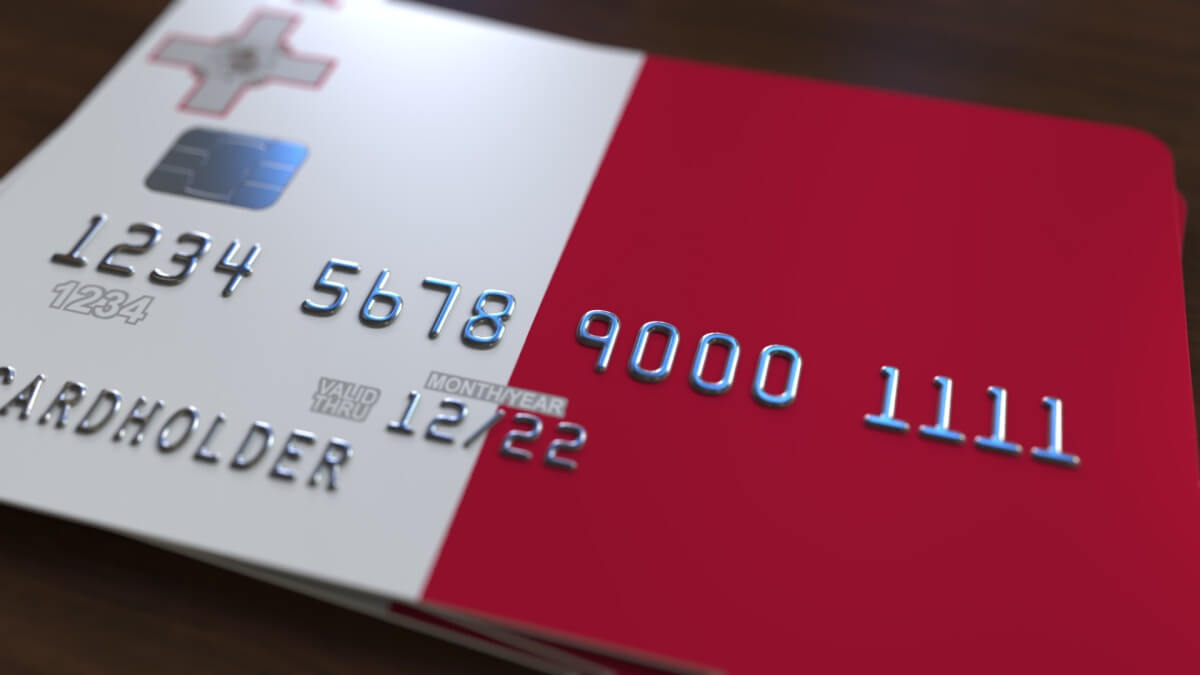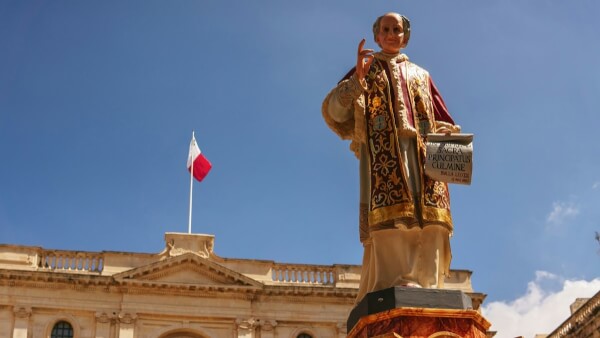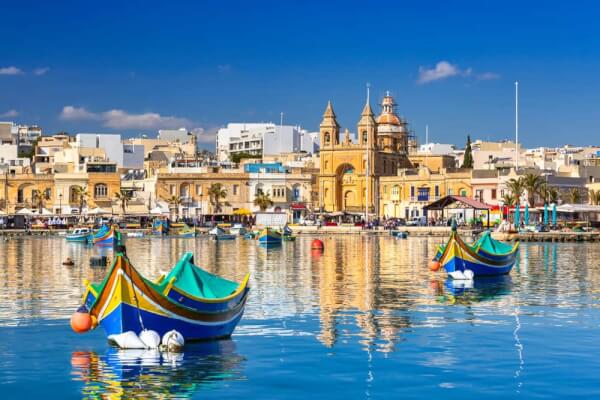How Malta citizenship by investment works
Thinking of applying for a Maltese passport? Read our guide on the Malta citizenship by investment programme, including the requirements, costs and benefits.

Planning a move to Malta from the UK? Whether you’re moving to the island nation for retirement, work or to start a business, one of the first things you might need to do as an expat is to open a local bank account.
In this helpful guide, we’ll cover everything you need to know about opening a bank account in Malta as a UK expat.
This includes info on the process of applying for an account, banking fees in the country, and some of the best Malta bank accounts for expats.
We’ll also show you a smart alternative to a bank account from the money services provider Wise - the Wise account. It lets you manage your money in 40+ currencies in Malta, the UK and worldwide.
Moving to Malta and want to take your savings with you? With Wise, you can send secure and trackable large amount transfers to Malta and 160+ countries worldwide for low fees* and mid-market exchange rates.
Learn more about the Wise account 💰
You may find it difficult (although perhaps not impossible) to open a bank account in Malta if you’re not living there, as many banks will ask for proof of a Maltese address when you apply. Some may also ask to see your residence permit.¹
You’ll need to get in touch with each bank to find out its specific requirements.
There’s no rules stating that foreign expats must have a local bank account in order to move to Malta.
You may be able to get along without one for a short time, especially if you can take advantage of multi-currency solutions such as the Wise account to send, spend and receive money in Malta and between countries.
But opening some kind of local or international current account is usually recommended. It’ll make it easier to cover everyday expenses like rent and bills, and to get paid if you’re working. Even things like signing up for a mobile phone contract and getting a mortgage will be simpler with a EUR account from a Maltese bank.
You’ll definitely need one if you’re starting a business in Malta, and you might find that it’s useful for buying or selling property in the country.
| 💡 Read more: How to transfer large amounts of money from the UK? |
|---|
It’s understandable to want to keep using your UK bank account when you move abroad. It could be more convenient, especially compared to the alternative - which is applying for an account with an unfamiliar foreign bank and waiting for it to be set up.
But is it actually possible to use a UK account in Malta?
Unfortunately, the answer is likely to be no. But it depends who you bank with back in the UK.
Some UK banks such as Barclays only let you keep your account open when living abroad under very specific circumstances. For example, if you’re a UK Crown employee or are planning to live abroad for less than 6 months before returning to the UK.²
Other banks such as international bank Santander say they will continue to service accounts when the holder moves abroad.³
So if you already have a Santander account, you should in theory be able to continue using it once you’ve moved abroad. However, Santander doesn’t operate in Malta, so you may struggle to access branch services and ATMs.
One obstacle you may face though is the currency. If you’re using a UK bank account, it’ll usually be denominated in GBP. You’ll be spending in euros (EUR) while in Malta, so you could lose out when it comes to currency exchange.
So all things considered, it could be a smart move to open a local account once you arrive in Malta - just to make life easier for yourself.
You shouldn’t experience any problems opening a bank account in Malta as a foreign national. There aren’t any rules preventing foreigners and indeed Brits from opening bank accounts.
Whatever reason you’re moving to Malta, you should be able to open an account at most banks as long as you have the right paperwork.
Some banks in Malta offer the option to open a bank account online, or at least start the process. This includes HSBC Malta.
But in other cases, you’ll need to make an appointment at a branch of the bank and take your ID and supporting documents along (more on that later). This is how it works with the Bank of Valletta, the country’s biggest bank.
If online account opening is an option, you’ll just need to check whether you’re eligible for it as a foreign expat. It’s likely that Maltese residency and proof of a local address will be key requirements, so you might not be able to apply online while living outside the country.
Student accounts can be opened at many Maltese banks, and most are available to both Maltese and international students.
Some options to check out include:
| 💡 Read more: Best debit card to use abroad: Top 6 UK picks |
|---|

The documents required to open a bank account in Malta will vary between banks, but generally you’ll need to have the following:⁴
Your passport or national ID card should suffice as proof of identity.
Some banks in Malta will ask for evidence that you have a legal right to live in the country, such as your residence permit.
You’ll also need to provide proof of a Maltese residential address, such as a recent (dated within the last 6 months) utility bill.
Some banks may also ask for proof of the source of funds you’ll deposit in the account, or a reference letter from your current or previous bank.
You might also need a Tax Identification Number.
There’s no single best bank in Malta for foreign expats, but a major or international bank could be a good bet. This will ensure access to a good range of branch locations and ATMs.
And as English is widely spoken in Malta, most banks will offer English-speaking customer service too.
Here’s a list of the most expat-friendly banks in Malta to check out:
Launched in 1910, APS Bank is one of the oldest banks in Malta.
It’s a retail banking specialist, with products including the APS Current Account. This comes with online and mobile banking, a debit card, chequebook and overdraft (subject to approval).
As it has a presence in both the UK and Malta, HSBC could be a good option to check out if you’re a British expat. It offers a familiar banking experience, especially if you already bank with HSBC in the UK.
This includes similar products such as the HSBC Advance current account, which comes with a credit card, travel insurance and other perks.
Established in 1974, Bank of Valletta (BOV) is the biggest bank in Malta. It offers a full range of personal, private, business and corporate banking services.
Its range of everyday banking accounts includes the BOV Current Account, which comes with everything you need for day-to-day money management.
BNF Bank (formerly called Banif Bank) was launched in Malta in 2008, and it also has a presence in the UK.
The bank provides retail, business and corporate banking services of all kinds. This includes a current account for deposits and withdrawals, payments and transfers. It comes with a debit card.
A bank isn’t the only way to manage your money overseas. There’s also the option of using a money app or digital account.
Here are a few of the most popular choices in Malta:
You can also check out other non-bank alternatives, which don’t have a banking licence but offer services such as accounts, payments and cards.
This includes the money services provider Wise, which has a multi-currency account, international debit card, transfer services and app available to use in Malta.
| 💡 Read more: Best online bank accounts in the UK |
|---|

Bank accounts and banking services in Malta do come with some fees. This includes fees for transfers and for cash withdrawals at ATMs not owned by your bank.
These will vary between different banks, so you should always check the small print before signing up for an account.
But here’s an idea at what kinds of fees to expect:
| Transaction/fee type | Typical fee |
|---|---|
| Current account - maintenance fees | Usually free (for active accounts which maintain a min. balance)⁵ |
| ATM cash withdrawal | Usually free at your own bank’s ATM⁶ |
| Getting a debit card | Usually free⁶ |
| Domestic payments (i.e. within Malta) | €0⁶ to €4⁷ (depending on amount and sending method) |
| International payments (i.e. to the UK from Malta) | Approx. €12 EUR⁶ |
| 💡 Read more: The best UK banks for sending money abroad |
|---|
Many current accounts come with no monthly fees, along with no to low transaction fees. You’ll need to shop around to find the best deal.
Accounts such as HSBC Advance offer free banking if you meet certain requirements , like paying in a minimum salary of €20,000 a year.⁸
It’s common for student accounts to have low to no fees.
As we’ve mentioned though, you may find it difficult to open any of these accounts without being an official Maltese resident.
Need to manage your money in multiple currencies or send transfers back home to the UK? There are alternatives to using a bank, such as Wise.
Open a Wise account and you’ll only pay a small, transparent fee* to send money in 40+ currencies (including EUR and GBP). Better still, you’ll get the mid-market exchange rate for every foreign currency transaction and your transfers are always secured and trackable.
Here are the main benefits for using Wise: |
|---|
|
You can also get a Wise card for a one-time fee of just £7 and use it to spend like a local in Malta and 150+ countries worldwide. There are no hidden fees*, and you can even connect your Wise card to Google Pay or Apple Pay.
Importantly, you can open a Wise account in advance of your move to Malta. This means you’re not left without a payment method while you’re waiting for your new bank account to be opened.
Sources used:
Sources last checked on date: 03-Sep-2024
*Please see terms of use and product availability for your region or visit Wise fees and pricing for the most up to date pricing and fee information.
This publication is provided for general information purposes and does not constitute legal, tax or other professional advice from Wise Payments Limited or its subsidiaries and its affiliates, and it is not intended as a substitute for obtaining advice from a financial advisor or any other professional.
We make no representations, warranties or guarantees, whether expressed or implied, that the content in the publication is accurate, complete or up to date.

Thinking of applying for a Maltese passport? Read our guide on the Malta citizenship by investment programme, including the requirements, costs and benefits.

A list of the top banks in Malta, including Bank of Valletta, HSBC, APS Bank, FIMBank, MeDirect Bank and Lombard Bank Malta.

Everything you need to know about moving to Malta from the UK. Read about visas, popular expat destinations, healthcare and more.

How to buy property in Malta as a foreigner, including house prices, getting a mortgage and tips for finding your dream home.

Cost of living in Malta varies from region to region. This guide outlines what you can expect in terms of living costs.

Malta may be the EU’s smallest state, but there's no shortage of reasons to visit. With a fascinating cultural heritage, attractive climate and relaxed...